Deep Focus: The Marseille Trilogy
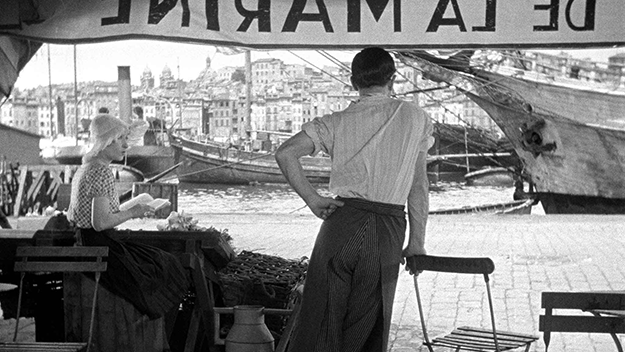
Marius
The “girl woos boy, girl loses boy” plot at the center of Marius (1931), Fanny (1932), and César (1936), playwright-turned-filmmaker Marcel Pagnol’s seriocomic Marseille Trilogy, is the steam engine that drives a marvelous old-school carousel. What makes this tragicomic merry-go-round so intoxicating is not its speed or pace (slow and steady), but the beauty of its weather-streaked, hand-carved figures as they chug up and down and come full circle.
Fanny (Orane Demazis), the honest, fresh-faced girl who sells shellfish for her mother in the Old Port of Marseilles, and her intense, conflicted lover, Marius (Pierre Fresnay), the bartender at his father’s saloon, the Bar de la Marine, set the story in motion. But Pagnol embeds them along a waterfront we come to know as intimately as the streets where we live, though its rites and rituals seem antique. Marius’s gruff widowed father, César (Raimu), exemplifies an existence based on tribal custom and instinct as well as practical wisdom. When César tells Marius how to mix a picon-lemon-curaçao cocktail, he says (to quote from Pagnol’s original play), “First, pour one third of curaçao. Careful: one very small third. OK. Now, one third of lemon. Slightly bigger. OK. Then, one GOOD third of Picon. See the color. See how nice it is. And finally, one BIG third of water. Here you are.” When Marius objects that there can only be three thirds to any one drink, César objects, “But idiot, it depends on the size of the third.” We know exactly what the patriarch means. César is just as canny when he measures the degree of shame a nice girl like Fanny would be able to tolerate if she ever got in trouble.
Over the course of three films, César and his best friends—the wealthy sail-maker and born sidekick Honoré Panisse (Fernand Charpin), the cheerfully inert ferry captain Félix Escartefigue (Paul Dullac), and the half-sly, half-naïve port inspector Albert Brun (Robert Vattier), an outsider from Lyon—enact classic expressions of boisterous camaraderie, whether competing at boules and bridge (César fancies himself a card sharp) or tippling amiably while observing the parade of Provencal life.
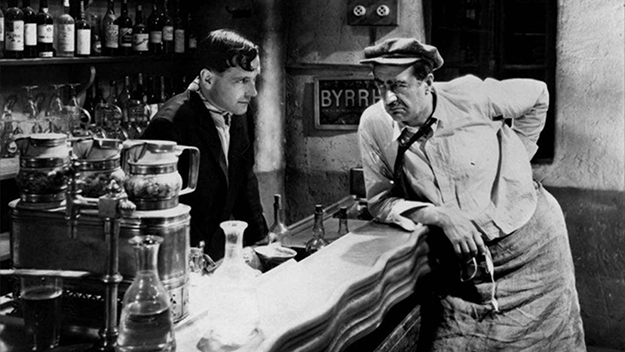
Marius
As he limns these brothers of the barroom, Pagnol, who grew up outside Marseilles, celebrates and satirizes the regional traits of earthy vitality and creative prevarication. Even when putting on shows of pride and temper, they key into each other’s rhythms and routines. Along with the wise Dr. Felicien Venelle (Édouard Delmont) and Fanny’s loquacious mother, Honorine Cabanis (Alida Rouffe), a demon for middle-class propriety (though she herself, before marriage, was her late husband’s mistress), the core ensemble conveys the warmth and friction of a tight-knit neighborhood where people are always into each other’s business. According to their rough-hewn etiquette, it’s proper to acknowledge that the skipper, Escartefigue, is a cuckold, but bad form to throw his wife’s nonstop infidelities in his face.
Some matters require utter candor. When 50-year old Panisse pursues 20-year-old Fanny, César and Honorine speak frankly and witheringly about the age gap. Panisse’s courtship of Fanny ignites Marius’s dormant love for her, but he also lusts to become a sailor and travel across the globe. When Marius finally embraces his love for his childhood friend, he tells her he would have left long ago, if not for her. We see what Marius can’t admit, even to himself: he hopes to escape an oppressive life. The question of whether he will stay with Fanny or become a sailor drives Marius to its dynamite conclusion; Fanny, beginning just after the previous movie ends, and César, unfolding 20 years later, reckon with the short- and long-term consequences.
For those lucky enough to see these films for the first time, I won’t give anything away. It’s enough to say that Marius’s decision thoroughly alters César’s, Fanny’s, and Panisse’s families. Moralistic conventions hem in the frank, virtuous Fanny, who must fear for her reputation every time she’s alone with Marius. As César tells him, in this world, “honor is like a match: you can only use it once.”
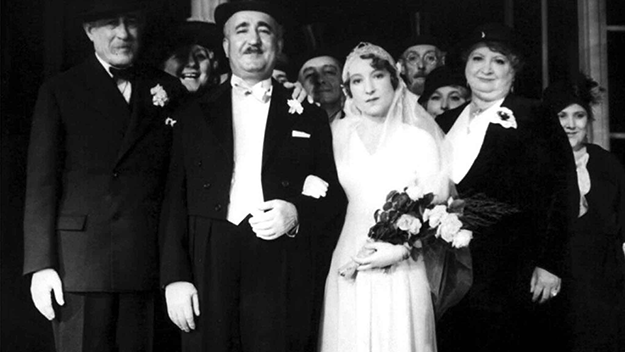
Fanny
Meanwhile, a lower-middle-class sort of machismo tongue-ties César and provokes Marius’s rebellions. To discuss these films as examinations of “bourgeois morality” and “gender roles” is to undercut their plainspoken complexity and charm. As the characters commit to their momentous decisions, then struggle to live with them, they reveal unexpected facets of their personalities. Charpin’s Panisse becomes casually heroic—a portrait of a comical petit bourgeois as a gallant domestic knight. Fresnay’s Marius, who at first registers as an aging arrested adolescent, grows more stirring as his bitterness deepens. And Demazis’s Fanny acquires a mental agility and toughness that make her into a formidable woman.
The trilogy dramatizes a community preserving its vitality by absorbing unconventional behavior. In César, Marius’s son, Césariot (André Fouché), must try to persuade the old man that “tolerance” is a positive word. The Marseille Trilogy, in its own generous, humanistic way, portrays why men like Raimu’s magnetically mulish César would strive to hang onto their traditions. Pagnol presents one marriage after another fracturing by death or infidelity, and, by the end, social class and education threaten to separate even blood relatives.
The characters’ uncertainties climb to the heavens. When César contemplates the death of a friend, he wonders (to quote Pagnol’s stage version), “What if, when he arrives at the corner of a cloud, he finds a God that he’s never been acquainted with? A black, yellow, or red God? Or one of those Gods dressed like puppets that you can see at the antique dealer’s, or the one who has a big belly? Or the one who has as many arms as a spider crab? . . . Can you imagine yourself, all weary from your death and dizzy from traveling to Heaven, trying to talk to a God who doesn’t understand you? And, whatever the number of prayers you make, he says: ‘What? I beg your pardon? What are you saying?’”
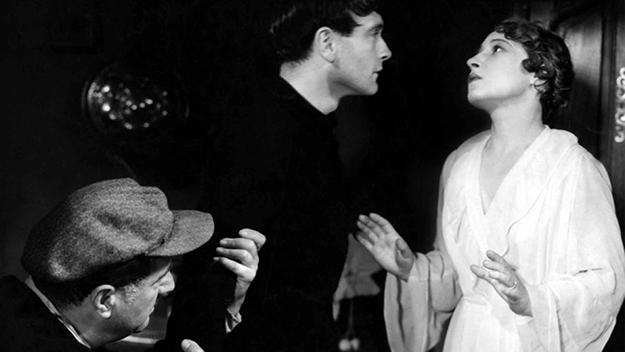
Fanny
When confronting the religion of cinema, Pagnol was both an enthusiast and an apostate. In his controversial critical writing, he argued that sound would be cinema’s salvation, because talkies would require film directors, like stage directors, to regard the text as king. There’s no question “the play’s the thing” in his Marseille Trilogy. Pagnol himself directed only César, also the sole script written directly for the screen. Pagnol wrote and produced the first two films, based on his triumphant plays, but Alexander Korda directed Marius (just three years before The Private Life of Henry VIII) and Marc Allegret did Fanny (a half-dozen years before Razumov). Of course, each director left his mark—Korda with the play of light and shadows he’d perfect in Rembrandt (1936), Allegret with a freeness and airiness that enliven outdoor scenes, such as when a trolley car interrupts César and his friends as they play boules. (Allegret had been a lover and protégé of André Gide, who, according to the IMDb, makes a cameo on the tramway, without credit, as does writer-director Pierre Prévert.)
What’s crucial is that Korda’s and Allegret’s films build not just on Pagnol’s celebrated texts, but also on the relationships Pagnol forged with the actors on stage, including his critical partnership with Raimu, the trilogy’s indisputable star. A native of Provence and a veteran of the Marseilles music halls, Raimu put his own stamp on the material. He turned down the part of Panisse and told Pagnol to cast him as César, proclaiming, “I want to be the owner of the bar and I want the play to happen on my premises!” Abetted by fellow music-hall troupers like Dullac and Rouffe, Raimu establishes a robust realistic style that keeps these films from falling into kitchen-sink dramedy. In these movies Raimu is like Jackie Gleason the jovial show-biz personality, Jackie Gleason the working-class hero-clown of The Honeymooners, and Jackie Gleason the dramatic actor of The Hustler and Requiem for a Heavyweight rolled into one. Whenever he’s on screen, he’s the center of attention. Pagnol dedicated the stage version of Fanny to Demazis, “who was Fanny herself, to a point where we could not imagine her differently.” After life imitated art, art imitated life: a year after filming Fanny, she and Pagnol had an out-of-wedlock child.
The great French film critic André Bazin praised Pagnol for creating a regional cinema that conveyed the essence of Provence in his canny use of dialect and Marseilles-born or -bred performers like Raimu and Fernandel. He also called Pagnol the only director from 1930 on to risk “a verbal excess comparable to the visual excess of D.W. Griffith or Erich von Stroheim.”
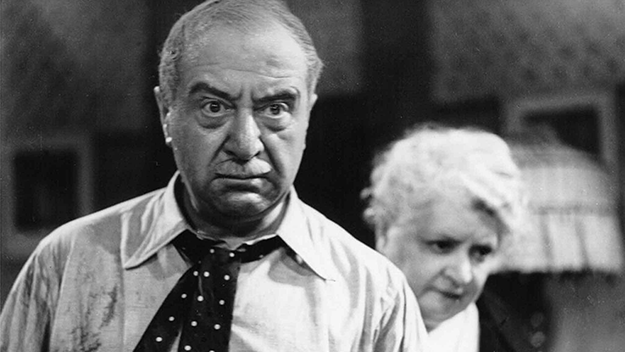
César
For me, Pagnol’s greatest contribution to movies is his breakthrough method of casting actors who intuitively understood the subject matter, fostering their extreme identification with the characters, then building his films not merely on his written words but also on their silent behavior. These movies include several perfectly timed theatrical gags, including “killing” a helmeted diving suit in Panisse’s sailing shop.
More often, though, laughter erupts and tears spill from the steady accretion of details as the performers make these roles their own. Vattier, as Brun, wrings an unusual, stop-and-go humor from the uncertainty of being a Lyonnaise living in Marseilles. But when Brun makes a statement that’s honest, decent, and true, Vattier delivers it with eloquent simplicity. In César Brun nods toward the empty seat where a dead friend used to lounge and says, “That chair is sadder than the grave.” It’s the genius of Pagnol’s Marseille Trilogy to make an object as mundane as a bar chair seem like T.S. Eliot’s “still point of the turning world.” At that moment, we feel as Eliot did, “Except for the point, the still point / There would be no dance, and there is only the dance.” Pagnol’s Marseille Trilogy is his dance of death and life.
Michael Sragow is a contributing editor to Film Comment and writes its Deep Focus column. He is a member of the National Society of Film Critics and the Los Angeles Film Critics Association. He also curates “The Moviegoer” at the Library of America website.







